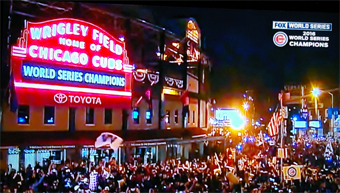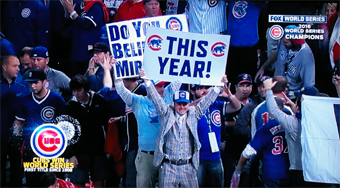
Images courtesy of Fox Sports
Cubs Win World Series in 7th Game, 10th Inning
| published November 3, 2016 |
By Alan Clanton & Earl Perkins,
Thursday Review editors
That most elderly and greatest of sports curses has finally been broken.
The Chicago Cubs smashed the longest, most enduring losing streak in baseball history by beating the Cleveland Indians in a 2016 World Series final among one of the most exciting games ever seen. The Cubs’ hard fought victory came in game seven, in the 10th inning, and only after a brief rain delay which may have helped to energize the Cubs, a team which had watched their early game lead shrink in dramatic style as the Indians battled ferociously to regain control of the home field match-up and capture the decisive game win.
Both teams seemingly dug in their heels, fighting tenaciously for a pivotal moment throughout all ten innings of a high scoring game. Final score: 8-7. The Cubs’ win smashes its infamous World Series drought—the last time Chicago won the World Series was in 1908.
For Cleveland, the loss was doubly bittersweet. The Indians have not been to a World Series since 1948, and its own non-championship record was—and remains—the second longest in baseball. Indians players and fans alike were already chanting “next year” as the Cubs celebrated on the field and as exhausted attendees slowly made their way from the stands.
Cleveland had taken a lead in the World Series early on, pulling ahead of Chicago and dominating with superior pitching and defensive skills. Cleveland had won 3 games to Chicago’s 1, and stood days ago on the brink of an early Series victory. But the Cubs struggled mightily to tie the series, and the final game was played out in grand style in front of a packed Cleveland field and in front of a massive television viewing audience. Overflow crowds watched the game on giant TV screens in the streets of Cleveland, even as thousands more watched in the streets of Chicago. An estimated 9,500 Chicago fans had traveled to Cleveland to witness the final game.
The Cubs are only the sixth team in baseball history to bounce back after a World Series deficit of three games to one, and only the third to do so while not on their home field. Cleveland becomes only the sixth team in baseball—and the first since 1985—to lose control of a World Series after having gained a three-to-one game advantage.
The seventh game also had one other notable moment for the history books: catcher David Ross became the oldest player in baseball history to hit a home run ball—out of the park, in this case—during a World Series. Ross had already planned to retire this week at age 39 after two decades of major league play.
For long suffering Chicago, the win clears the boards and erases more than a century of pain and misery and unfortunate jokes: no more black cats crossing the field, no more Curse of the Billy Goat, no more rubbing of rabbit’s feet in the cheap seats. The shattering win may also bring an end to decades of jokes by stand-up comics and late night TV hosts.
For baseball fans—a superstitious breed which pays homage to strange signs, legendary curses, and even aberrant weather patterns—the Chicago Cubs victory is a shift in the tectonic plates, and undoubtedly the most remarkable return from the wilderness ever accomplished in all of American sports. For citizens of Chicago, and for generations of its beleaguered but loyal Cubs fans, the win brought throngs of cheering people into the streets as the city finally sheds its intractable legacy of a long suffering baseball team.
Wednesday night’s closing game may also be remembered as one of the most intensely-fought and exciting finales in baseball history, defying the clichés of those who eschew baseball for its slow stretches and sluggish pace. The high adrenaline levels may have been spurred, some sports analysts believe, by the historic opportunity for both teams to bring to an end a long drought from the title, even as enthusiastic fans remained fixed on every nuance of every pitch and every play.
The final game also drew a massive TV audience and shattered records; game six, in Cleveland on Tuesday night, was the second most watched sixth game in television history (after the famous 1997 match-up between the Cleveland Indians and Florida Marlins), and spurred Fox Sports ad revenues into orbital altitudes for the next night. Though ratings are not official for Wednesday’s dazzling finale, early estimates point to a record-breaking viewership for baseball in the age of pro football and eye-popping Super Bowl ratings.
On the east coast, the game proceeded well past midnight—the result of a brief rain delay and that now famous tenth inning. Early estimates, however, suggest that many viewers remained fixed on the game, drawn to the inescapable drama unfolding with each pitch and each swing.
For fans of the Cubs, it was a long overdue moment to savor. For fans of Cleveland, the epic struggle for next year begins next season. For Cubs fans and players alike, the curse ends now.
In Chicago, police estimated some 12,000 people crowded the streets and sidewalks around Wrigley Field, where the throngs exploded when the Cubs clinched the game in the tenth inning. A victory kept at bay for more than a century, they hoisted the “W” flag up the pole at Chicago's Wrigley Field as the exuberant crowd sang their favorite song—Go, Cubs, Go—last night, capping a week of pitching duels, high scores and pleased fans.

End of the Curse
Lifelong Cubs fan and musician Steve Goodman must be smiling down from heaven today. The native Chicagoan wrote Go! Cubs! Go! as an homage to the city he loved so dearly. Diagnosed with leukemia at 22, Goodman made great use of his few remaining years. Not considered a superstar in the music business, he nevertheless penned numerous songs with incredible lyrics that spoke to the hearts of millions. You may recall “City of New Orleans,” “You Never Even Call Me By My Name,” “My Old Man” and “You're the Girl I Love.”
Long-considered a fantastic entertainer and songwriter, Goodman wrote about the things and people he knew, which especially endeared him to residents of the upper Midwest. It's not like he was might run out of story lines. Chicago was long known for crooked politicians, the St. Valentine's Day Massacre, the Great Fire of 1871, and its lengthy history stretching back to the late 1600s when local Indians named the area for its wild garlic.
Goodman passed away at the young age of 39 in 1984, missing Chicago's celebration when his beloved Cubbies clinched the 2016 National League Championship Series. However, last night those thoughts were set aside as a crowded house rejoiced a huge Cubs' victory, keeping Chicago's hopes alive for at least a couple more days. You could tell those Cubs fans were going to party the night away, worrying later about whether they might show up for work in the next few days.
They got the power, they got the speed
To be the best in the National League
Well this is the year and Cubs are real
So come on down to Wrigley Field.
It was 13 years ago this month that Steve Bartman made his ill-fated attempt at catching a foul ball in in the NLCS, which many Cubs fans say cost Chicago the pennant. The Cubs led the Florida Marlins 3-0 in the game and 3-2 in the series, but the Marlins would win that game 8-3 and close out the series the following night at Wrigley, advancing to the 2003 World Series, where they defeated the New York Yankees.
The Cubs are probably the first thing people worldwide think about when the subject of Chicago comes up in conversation. Yes, those Lovable Losers who haven't won the World Series since 1908, although they almost won the year we dropped the bomb on Japan in 1945. After stretching the series to seven games, Chicago fell to the Detroit Tigers, but not before the Cubs were cursed by the legendary Billy Goat Curse.
The story began when a goat fell off a truck and subsequently limped into a nearby tavern, which was owned by Greek immigrant Billy Sianis. He nursed the goat back to health, and when the '45 World Series rolled around, Sianis purchased two $7.20 box-seat tickets to Game 4 between the Cubs and Detroit Tigers. Opting to take his pet goat to the game, the two were welcomed at the Wrigley turnstile, and even allowed to galavant around the playing field, until ushers escorted them from the diamond so the game could begin. Sianis' pet goat, Murphy (or Sinovia, depending on which account you reference), sported a blanket with a sign pinned to it which read "We Got Detroit's Goat."
Following a heated argument, Sianis and the goat were given permission to occupy the box seats he paid for. However, as the game progressed, rain swept through the stands and an objectionable odor began emanating from said goat, which prompted Cubs owner Philip Knight Wrigley to urge his security people to eject the pair. As Sianis and the goat exited Wrigley Field, he evidently placed a curse upon the Cubs that they would never win another pennant or play a World Series game at Wrigley because the Cubs organization had insulted his goat. Sianis subsequently left the country to vacation back home in Greece, from whence he supposedly dashed off a telegram to Wrigley, which said "Who stinks now?"
Then there's the story of the '69 Cubs, who came out of the gate with a spectacular record, led by future Hall of Famers Ernie Banks, Ferguson Jenkins, Ron Santo and Billy Williams, along with the game-calling skills of catcher Randy Hundley. Starting pitcher Ken Holtzman pitched a no-hitter August 19, giving Chicago an 8 1/2-game lead over the St. Louis Cardinals and 9 1/2 games over the New York Mets. Then, amazingly and improbably, a black cat walked behind the Cubs' on-deck circle where Santo was standing, and the Cubs and their record soon fell apart, with Chicago finishing eight games behind the Mets. That's why you hear about the '69 Amazin' Mets, instead of the Amazin' Cubs. Go to Google and do your own search on the cat that night: the film footage tells the story.
Many Cubs fans wax nostalgic about the game-calling skills of Jack Brickhouse and Harry Carey, along with George Will's eloquent stories and columns about those lovable losers penned when he wasn't opining on American politics. But I love Goodman's connection to the team. Besides Go! Cubs! Go!, the American folk music singer-songwriter penned "A Dying Cubs Fan's Last Request" and "When the Cubs Go Marching In."
But my favorite of the trio was Go! Cubs! Go!, which Goodman forwarded to Cubs' management where it languished in a drawer for several years, until someone finally had it played over the public address system. The crowd went nuts, and they've played the tune after every Cubs victory for many years. Listening to the crowd sing the song after last night's victory gave me goosebumps, even though I was watching it on television.
Related Thursday Review articles:
Who Stinks Now? The Cubs, The Indians, a French Historian; Earl Perkins; Thursday Review; October 27, 2016.
When You Come to a Fork in the Road, Take It; Kevin Robbie; Thursday Review; October 14, 2015.
